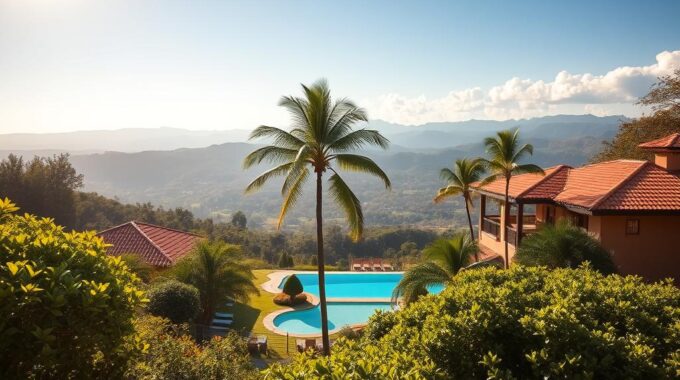Can US citizens get residency in Costa Rica? Find out the process, costs, and requirements with CRIE's expert help and achieve your dream of living in Costa Rica.

Private Lending for Luxury Investment Costa Rica – Secure Funding
Costa Rica’s stunning natural beauty and stable economy have made it a magnet for foreign investors, with foreign investment in real estate increasing by over 20% in the past year alone.
While finding the perfect property is straightforward, financing it can be challenging for international buyers. Traditional banking options often come with stringent requirements and limited flexibility.
GAP Equity Loans offers a viable alternative, connecting borrowers with private investors and providing competitive rates, lower fees, and flexible financing options. By using Costa Rican property as collateral, buyers can access significant funding with easier qualification.
Understanding the Costa Rican Investment Landscape
Costa Rica has emerged as a prime destination for luxury real estate investment, driven by its stable economy and breathtaking natural beauty. The country’s diverse landscapes, from lush rainforests to pristine beaches, offer a unique blend of investment opportunities.
The Growing Luxury Real Estate Market in Costa Rica
The luxury real estate market in Costa Rica is experiencing significant growth, with properties in prime locations like Guanacaste and coastal Pacific towns appreciating by 8 to 15 percent annually. This growth is driven by strong demand, limited inventory, and increased tourism infrastructure. Buyers can choose from a variety of properties, including beachfront condos, luxury homes, and eco-lodges.
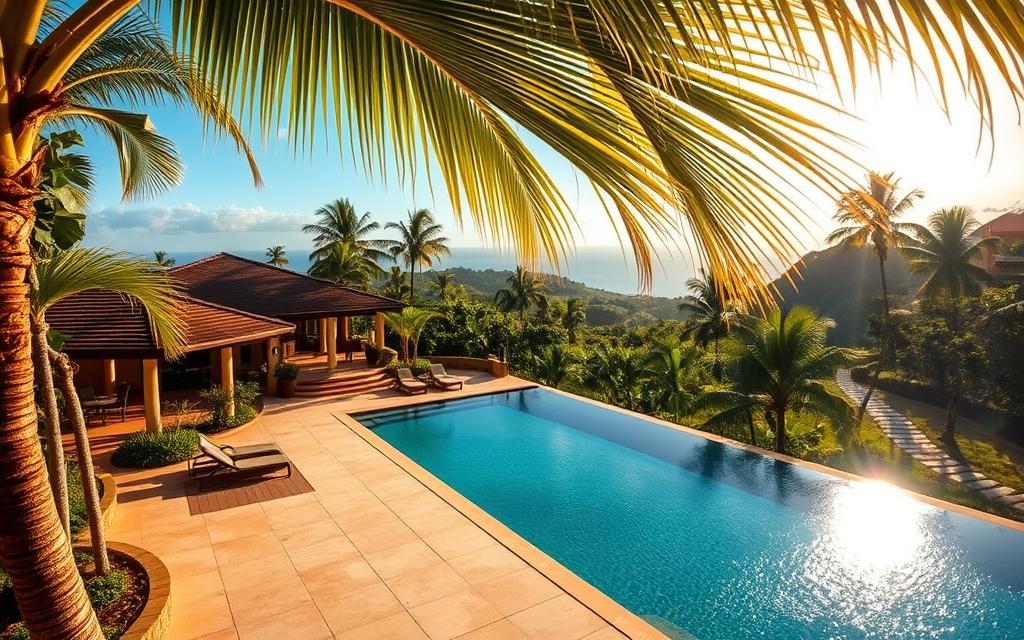
Why International Investors Are Choosing Costa Rica
International investors are drawn to Costa Rica due to its political stability, strong property rights for foreigners, and eco-conscious culture. The country’s stable economy and developing infrastructure create long-term investment opportunities in the luxury segment. With a 20% increase in foreign investment in Costa Rican real estate over the past year, the market demonstrates growing international confidence.
Traditional Banking Limitations for Foreign Investors
Foreign investors often face significant hurdles when attempting to secure financing through traditional Costa Rican banks. While local financing options exist, they are generally less accessible to international buyers.

The reluctance of Costa Rican banks to lend to non-residents stems from historical experiences, including real estate booms that led to numerous foreclosures and unfinished projects, making banks more cautious.
Why Costa Rican Banks Restrict Lending to Non-Residents
Costa Rican banks are hesitant to provide financing to foreign investors, particularly those without established residency status. The primary reason is the higher risk associated with lending to non-residents, due to jurisdictional challenges in case of default.
Documentation and Residency Requirements
To be considered for traditional bank financing, foreign investors must meet extensive documentation requirements. Residency status plays a crucial role in loan approval, with non-resident buyers facing stricter requirements and longer approval times. Obtaining temporary or permanent residency can significantly improve the chances of qualifying for bank financing.
Alternative options, such as seller financing, offshore lenders, or personal funds from abroad, are often utilized by foreigners. Working with a knowledgeable real estate agent and attorney can help navigate these challenges.
Private Lending for Luxury Investment Costa Rica: An Overview
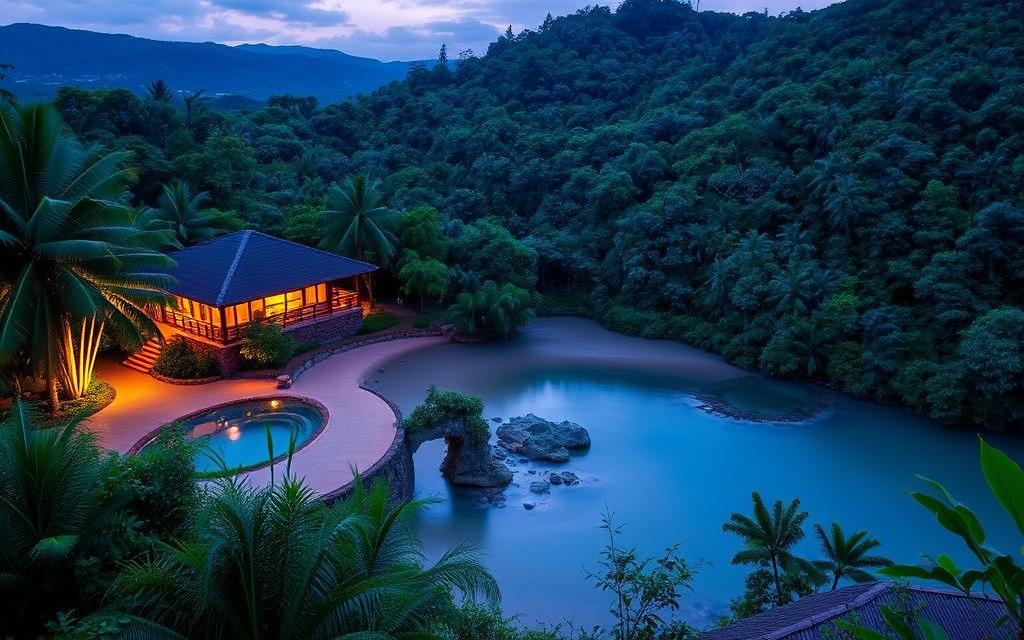
Private lending is becoming a popular choice among international investors looking to acquire luxury properties in Costa Rica. This financing option has emerged to fill the gap left by traditional banking limitations, offering a more flexible and faster alternative for securing funds.
How Private Lending Differs from Traditional Financing
Private lending differs significantly from traditional bank financing in terms of approval criteria, funding speed, and flexibility in loan terms. While traditional banks often have stringent requirements and slower processing times, private lenders can offer more tailored solutions to suit the needs of luxury investors.
Types of Private Lending Available in Costa Rica
In Costa Rica, various types of private lending are available, ranging from attorney-facilitated loans to more structured offerings from companies like GAP Equity Loans. These options cater to different needs, whether it’s short-term bridge financing or longer-term funding for luxury property acquisitions and improvements.
By using Costa Rican property as collateral, investors can secure private loans, providing a viable financing solution for their luxury investments.
GAP Equity Loans: A Solution for Luxury Investors
GAP Equity Loans offers a tailored financial solution for luxury investors looking to capitalize on Costa Rica’s thriving real estate market. By using their Costa Rican property as collateral, investors can access significant capital for various investment purposes.
Services and Loan Options Available
GAP Equity Loans provides a range of loan options to suit different investment strategies. Investors can borrow between $50,000 and $1,000,000, with loan terms ranging from 6 months to 3 years. The interest rates are competitive, starting at 12% and adjusting based on the loan-to-value ratio and other factors.
Competitive Advantages Over Traditional Banks
Unlike traditional banks, GAP Equity Loans offers a more streamlined and flexible financing process. By connecting borrowers directly with private investors, GAP Equity Loans can provide faster approvals, lower documentation requirements, and more personalized loan terms. This approach simplifies the qualification process, making it more accessible to foreign investors who may struggle with traditional banking requirements.
The focus on using property as collateral allows GAP Equity Loans to offer more flexible financing options. This is particularly beneficial for luxury investors who may not meet the stringent criteria of traditional lenders.
Using Your Costa Rican Property as Collateral
Leveraging your Costa Rican property as collateral can unlock significant financial opportunities. For luxury property investors, this can be a strategic move to secure funding for further investments or other financial needs.
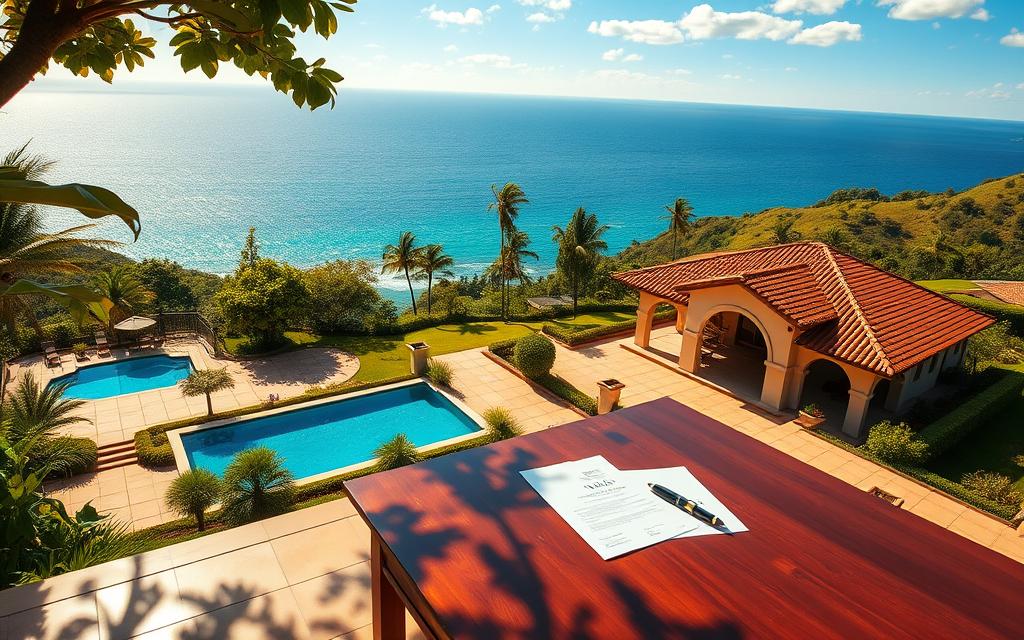
How Home Equity Loans Work in Costa Rica
In Costa Rica, home equity loans allow property owners to borrow against the value of their property. This financial product is particularly useful for international investors who may not qualify for traditional bank financing due to residency or other restrictions. GAP Equity Loans offers a streamlined process for securing funds, using the property as collateral.
Property Valuation Process and Considerations
The property valuation process involves a comprehensive assessment, including measurements, registry verification, and legal clearance checks. GAP Equity Loans conducts these evaluations for free, ensuring that the property’s value is accurately determined. By placing a first-degree lien or mortgage on the property, lenders secure their investment while enabling borrowers to access necessary funds.
Loan Terms and Interest Rates for Luxury Investments
Costa Rica’s luxury real estate market offers various private lending solutions with interest rates starting at 12% and loan terms ranging from 6 months to 3 years. These financial products are designed to cater to the diverse needs of luxury investors, providing them with the necessary capital to acquire, renovate, or refinance their properties.
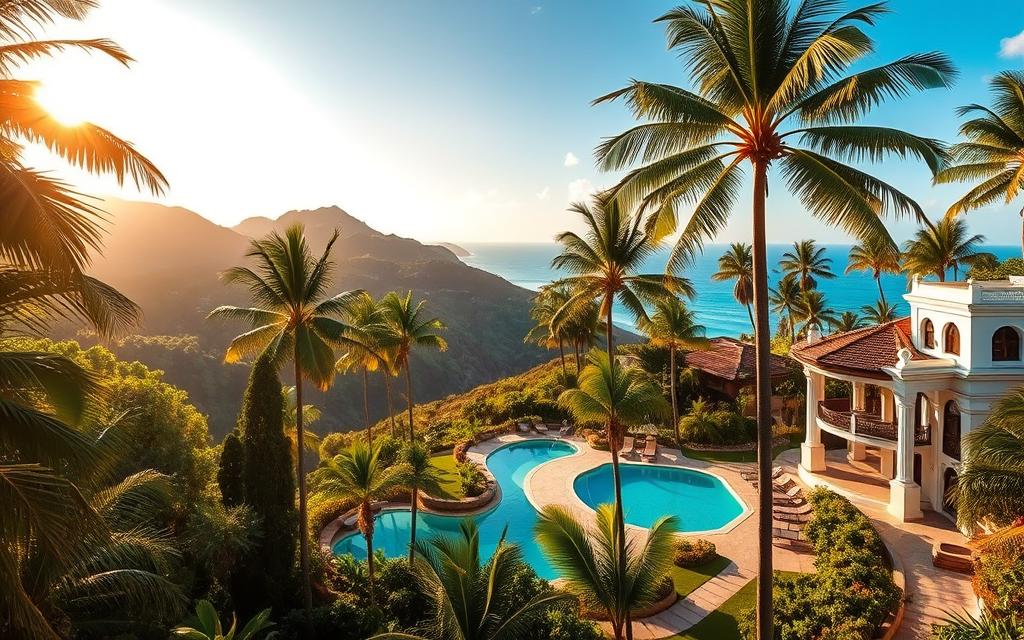
Understanding Interest Rates Starting at 12%
The interest rates for private loans in Costa Rica begin at 12%, reflecting the unique risk profile associated with luxury investments. Factors such as the property’s location, type, and loan-to-value ratio can influence the final interest rate. For instance, properties located in prime areas like San José or Tamarindo may qualify for lower interest rates compared to those in more remote locations. For example, a property in Samara that is slightly outside the central area might incur an interest rate of 14% due to the perceived higher risk.
- Interest rates are determined based on the risk assessment of the property and the borrower.
- The loan-to-value ratio plays a significant role in determining the interest rate.
- Properties in prime locations generally qualify for more favorable interest rates.
Loan Duration Options: 6 Months to 3 Years
Private lending for luxury investments in Costa Rica offers flexible loan duration options, ranging from 6 months to 3 years. This flexibility allows investors to choose a loan term that aligns with their investment strategy, whether it’s a short-term fix-and-flip project or a longer-term hold. Additionally, interest-only payment structures during the first year can help improve cash flow during the initial investment phase.
- Short-term loans (6-12 months) are ideal for renovation projects or quick flips.
- Medium-term loans (1-2 years) suit investors looking to hold properties for a longer period.
- Longer-term loans (up to 3 years) provide stability for investors with long-term strategies.
Loan-to-Value Ratios and Borrowing Limits
In Costa Rica’s luxury real estate market, loan-to-value ratios significantly impact the borrowing capacity of investors. The loan-to-value (LTV) ratio is a critical factor that lenders use to assess the risk associated with lending against a property. It represents the percentage of the property’s value that the lender is willing to lend.
Borrowing Range
GAP Equity Loans offers a borrowing range of $50,000 to $1,000,000, catering to various luxury investment needs in Costa Rica. Whether it’s for smaller property improvements or major acquisitions, the flexibility in borrowing limits allows investors to leverage their property’s value effectively.
Impact of LTV on Interest Rates and Terms
The LTV ratio directly influences the interest rate and terms offered to borrowers. A lower LTV ratio indicates lower risk for the lender, potentially leading to more favorable interest rates. For instance, borrowers with an LTV ratio between 5% and 10% may qualify for interest rates as low as 10%. This is because the loan amount is significantly less than the property’s value, reducing the lender’s risk.
For example, a borrower seeking a $100,000 loan can secure favorable terms by using a property worth $1-2 million as collateral. This scenario results in an LTV ratio of 5-10%, qualifying the borrower for lower interest rates. In contrast, higher LTV ratios are associated with higher interest rates due to the increased risk for the lender.
The Application Process for Private Lending
The process of applying for private lending for luxury investments in Costa Rica is both efficient and reliable. This streamlined process is designed to provide luxury investors with quick access to funds, enabling them to capitalize on investment opportunities without the delays associated with traditional banking.
Required Documentation and Eligibility Criteria
To apply for private lending, buyers will need to provide specific documentation, which may vary based on their residency status and the type of luxury investment being financed. The eligibility criteria are designed to be accessible, with a focus on the value of the property being used as collateral. This approach makes it possible for foreign investors without a Costa Rican credit history to qualify for loans.
- Documentation required may include property deeds, identification, and financial statements.
- Eligibility is primarily based on the value and legality of the property being used as collateral.
Timeline from Application to Funding
The timeline from application to funding is typically less than two weeks. This rapid turnaround is made possible by a thorough yet efficient property evaluation process, which includes registry verification and legal clearance checks. For more information on the private lending process and to explore loan options, visit GAP Equity Loans.
Once the property evaluation is complete, funds can be disbursed quickly, allowing investors to move forward with their luxury investment projects in Costa Rica.
Legal Considerations for Foreign Borrowers
Understanding the legal framework governing private lending in Costa Rica is crucial for foreign borrowers. The country’s legal environment for foreign property buyers involves specific regulations and protections that differ significantly from those in North America and Europe.
Understanding Costa Rican Lending Laws
Costa Rican lending laws require a licensed notary public to oversee real estate closings, transfer ownership, and register the property title. This process involves several legal fees and costs, including a 1.5 percent transfer tax and registration fees. Legal closing costs typically range from 1.25 to 2 percent of the purchase price.
- Legal guidance is essential for navigating Costa Rica’s property laws.
- Notaries public play a critical role in documenting and registering loans secured by property.
- First-degree liens are structured to protect lender interests while respecting borrower rights.
Legal Protections for Both Lenders and Borrowers
The legal framework in Costa Rica provides protections for both lenders and borrowers. For lenders, first-degree liens on the property secure their interests. Borrowers are protected through transparent lending practices and legal recourse in case of disputes. Working with experienced legal professionals specializing in Costa Rican real estate law can prevent potential complications and ensure a smooth transaction.
Strategic Uses of Private Lending for Luxury Investments
In Costa Rica’s competitive luxury real estate market, private lending provides a strategic advantage for investors looking to acquire or renovate high-value properties. Private lending offers a versatile financing solution that enables investors to capitalize on emerging opportunities and achieve their investment goals.
Financing Luxury Property Acquisitions
Private lending can be used to quickly secure luxury properties in competitive markets where speed of funding is essential to closing deals. This is particularly beneficial for foreign investors who may face challenges in securing traditional financing. By leveraging private lending, investors can rapidly capitalize on investment opportunities in Costa Rica’s luxury property market.
Funding Property Improvements and Renovations
Private lending can also be used to fund property improvements and renovations, significantly increasing property values and rental income potential. For instance, adding luxury amenities such as swimming pools or guest houses can enhance the appeal of a property to the luxury market. Approximately 80% of private lending customers in Costa Rica use funds for Airbnb, boutique hotels, and tourism-related businesses, highlighting the strategic advantages of private lending for these purposes.
Comparing Private Lending Options in Costa Rica
The Costa Rican market presents several private lending alternatives for foreign investors, requiring a careful comparison to determine the best fit. When considering luxury investments in Costa Rica, it’s essential to understand the various financing options available.
Private lending options in Costa Rica include structured private lending through companies like GAP Equity Loans, seller financing, and hard money loans. Each of these options has its own set of advantages and limitations, including different interest rates, terms, and security requirements.
Private Lenders vs. Seller Financing vs. Hard Money Loans
Seller financing is a popular choice among buyers in Costa Rica, especially non-residents. It typically requires a down payment of 30 to 50 percent, with loan terms spanning 3 to 5 years and interest rates between 6 and 8 percent. In contrast, structured private lending and hard money loans offer different terms and conditions that may better suit certain investment goals.
Finding the Right Financing Solution for Your Investment Goals
To choose the most suitable financing option, investors must consider their specific investment goals, whether they are focused on short-term property flips or long-term luxury holdings. By evaluating the typical down payment requirements, interest rate ranges, and term lengths for each option, investors can make informed decisions that align with their objectives in Costa Rica.
Risk Management and Due Diligence
Investors in Costa Rica’s luxury property market must conduct thorough due diligence to ensure secure private lending. While Costa Rica is considered a safe place to invest, there are common mistakes that buyers should avoid.
Common Pitfalls to Avoid When Securing Private Lending
One of the most frequent errors is neglecting proper due diligence. This includes verifying that the property title is clean, ensuring the property is properly zoned, and confirming that any structures are permitted and legally built. Maritime zone regulations are another area where buyers can make costly mistakes.
Protecting Your Investment Through Proper Documentation
To avoid potential risks, it’s crucial to work with professionals familiar with Costa Rican property law. Proper documentation is key, including verifying the property’s title, zoning compliance, and any existing liens. Escrow services play a vital role in protecting both lenders and borrowers by ensuring that transactions are conducted securely and in accordance with the agreed-upon terms.
By prioritizing due diligence and working with experienced professionals, investors can mitigate risks associated with private lending for luxury investments in Costa Rica.
Conclusion
As we’ve explored throughout this article, private lending offers a robust solution for international investors looking to capitalize on Costa Rica’s booming luxury real estate market. By addressing the limitations of traditional banking for foreign investors, private lending provides a streamlined and efficient financing process.
GAP Equity Loans stands out with its competitive rates starting at 12%, flexible terms ranging from 6 months to 3 years, and a simplified application process. This makes financing accessible to international buyers, enabling them to achieve their investment goals in Costa Rica’s luxury property market.
To ensure a smooth and secure transaction, it’s crucial to work with experienced professionals who can guide you through the private lending process. For more information on how GAP Equity Loans can help you finance your luxury investment in Costa Rica, visit www.gapequityloans.com or contact them via WhatsApp +(506)-4001-6413, USA/Canada (855)-562-6427, or email info@gap.cr.


